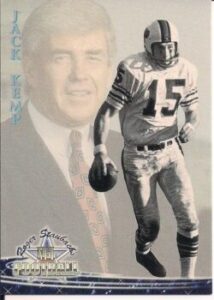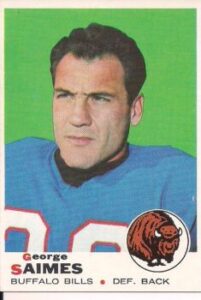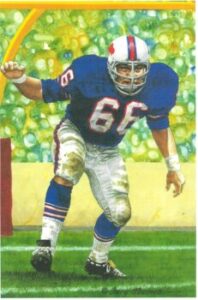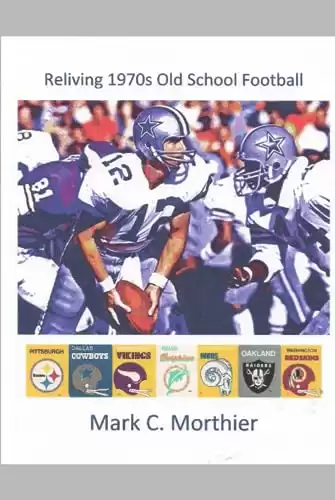I began watching Pro Football in 1969, probably sooner, since my father and older brother were sports fans, but I was too young to remember much of it. I turned seven in 1969, and that’s when I started watching with more interest and studying the game’s history.
But admittedly, I knew more about the NFL history than I did about the AFL, and that’s probably still the case. I learned about the Raiders, Chiefs, and Jets because they had all played in the Superbowl. I didn’t know as much about the other seven AFL teams.
LISTEN ON YOUR APP OF CHOICE
1964 Buffalo Bills
So, in this article, I will talk about the 1964 Buffalo Bills. The 1964 Bills had what many consider the best team in AFL history. While some might argue, few would dispute that they had the best defense. They allowed only 918 rushing yards in fourteen games and only 3,878 in total yards.
The Bills offense wasn’t too shabby either, gaining 5,206 total yards and scoring 400 points.
The season began with an impressive 34–17 win over the KC Chiefs at War Memorial Stadium. The Bills led 31–0 after the first quarter before putting it into cruise control for the remainder of the game.
Although the Bills defense had a tough time stopping Chiefs quarterback Lenny Dawson, who passed for 253 yards and two touchdowns, they held KC to only 64 yards rushing. On offense, Buffalo receiver Glen Bass had a big day, catching five passes for 98 yards and two touchdowns.
Quarterback Jack Kemp had a tough day against the Denver Broncos, throwing four interceptions, but the Bills’ running game made up for it, gaining 230 yards. Cookie Gilchrist gained 92 of those yards and scored two touchdowns. Buffalo won easily 30–13.
The Defending AFL Champs
The Bills blasted the defending AFL Champion SD Chargers 30–3 in week three. Big plays were the order of the day. Defensive back Butch Byrd got things started with a 75-yard interception return.
In the second quarter, Hagood Clarke returned a punt 53 yards to put the Bills ahead 14–3. In the fourth quarter, backup QB Daryl Lamonica connected with receiver Elbert Dubenion for a 40-yard touchdown. Dubenion had five receptions on the day for 123 yards.
In a week four game against the Raiders, a struggling Jack Kemp was replaced by Daryl Lamonica, who connected with Elbert Dubenion on a 44-yard touchdown strike. Lamonica threw only ten passes, but those passes gained 164 yards. Cookie Gilchrist had another big day, gaining 91 yards on the ground and 87 yards receiving. The Bills gave up only 90 yards rushing on defense and had six sacks. The final result was a 23–20 victory.
Despite five turnovers, the Bills destroyed the Houston Oilers 48–17. The Bills defense held Houston to only eight first downs and 137 total yards while the offense racked up 559 yards. Jack Kemp passed for 378 yards and three touchdowns, one a 94-yard strike to Glenn Bass.
Bass gained 147 yards for the day and scored two touchdowns. Elbert Dubenion gained 183 yards with one touchdown. Cookie Gilchrist gained 92 rushing and 48 yards receiving with two touchdowns.

The following week, the Bills had a 28–0 lead against the Chiefs in the 3rd quarter, but KC came roaring back to close the gap to 28–22 before Buffalo scored one more touchdown to make the final score 35–22.
Jack Kemp had a good day, passing for 256 yards and three touchdowns. Elbert Dubenion continued to give defenses fits, gaining 122 yards and scoring two touchdowns, one a 55-yarder. The Bills defense recorded six sacks on the day.
In week seven, the stingy Buffalo defense held the NY Jets to just 66 yards rushing while the Bills’ offense racked up 527 total yards. Bobby Smith ran for 98 yards and scored one touchdown, while Elbert Dubenion torched the Jets’ defense with 218 yards receiving and two touchdowns. The final score was Buffalo 34, New York 24.
The Bills’ defense gave up only 35 yards rushing against the Oilers, but they had a tough time stopping quarterback George Blanda, who threw the ball 68 times for 393 yards. Offensively, Daryl Lamonica and Jack Kemp struggled, completing only 7 of 18 passes and throwing three interceptions.
But the Bills running game more than made up for it. With great blocking from the offensive line, Buffalo rushed for 290 yards. Cookie Gilchrist gained 139 of those 290 yards. The Bills won 24–10.

A Shutout Towards Perfection?
Buffalo cruised to an easy 20–7 win over the Jets in week nine. Many of the Bills’ opponents gave up trying to run against their stingy defense. The Jets ran the ball only thirteen times for 31 yards. Jets quarterback Dick Wood threw for 367 yards, but the Bills defense intercepted him five times and sacked him three times.
Offensively, Daryle Lamonica connected with Glen Bass for an 80-yard touchdown completion. Bass finished the game with eight receptions for 231 yards. Cookie Gilchrist had a 67-yard touchdown run and finished the game with 99 rushing yards.
The Bills were now 9–0, and some were beginning to wonder if they could go undefeated. Week ten would be a true test against the Boston Patriots. This was the first time the two teams would meet since Boston defeated Buffalo 26–8 in last season’s playoff game.
The Bills wanted revenge but lost again, this time 36–28. Buffalo outgained the Patriots 386 yards to 256, and the Bills defense allowed only 41 rushing yards. Offensively, Glenn Bass caught six passes for 141 yards, and Ed Rutkowski caught seven for 127 yards. But eight penalties, seven sacks, and six turnovers did them in.
In week eleven, the Bills trailed the Chargers 24–14 in the fourth quarter, but they came back to tie it at 24 all before Pete Gogolak kicked a 33-yard field goal to give Buffalo a 27–24 victory. The Bills defense forced seven turnovers and allowed just 52 yards rushing. The Bills secondary had their hands full trying to contain Lance Alworth, who caught four passes for 185 yards and two touchdowns.
Although Buffalo recorded only one sack in the game, it was an important one, as Mike Stratton tackled John Hadl in the end zone for a safety. Cookie Gilchrist had another solid game, carrying the ball 21 times for 87 yards.
|
$30.99
|
$10.95
|
$11.95
|
No Perfection, But Champions?
The following week, Buffalo suffered an upset at the hands of the Oakland Raiders 16–13. The Bills’ offense never got on track, gaining only 12 first downs and 247 yards in total. The defense allowed almost 300 yards passing, but to be fair, opponents had all but given up trying to run the ball against Buffalo and were passing on nearly every play.
Three weeks earlier, there was talk of an undefeated season; now, the Bills were in danger of losing the Eastern title to Boston, who were only a half-game behind in the standings.
The Bills offense struggled again in week thirteen, but their defense smothered the Broncos, allowing only seven first downs and giving up only 117 total yards while recording an astounding 11 sacks—final score: Buffalo 30, Denver 19.
So it came down to the season’s final game against the Patriots. Whoever won this game would win the Eastern title and play the Western Champion San Diego Chargers for the AFL Championship trophy.
Buffalo led 17–6 at halftime and held on for a 24–14 victory. The Patriots didn’t waste any time trying to establish a running game. They ran the ball only 12 times for 33 yards and passed 41 times for 294 yards. Although Jack Kemp threw three interceptions, he also completed 14 passes for 286 yards. Glen Bass gained 103 yards receiving, and Elbert Dubenion gained 127 yards with one touchdown.
Ten of the Bills players made the Pro Bowl. Jack Kemp, Cookie Gilchrist, Elnert Dubenion, tight end Ernie Warlick, tackle Stew Barber, guard Billy Shaw, defensive tackle Tom Sestak, linebacker Mike Stratton, cornerback Butch Byrd, and safety George Saimes. Gilchrist, Barber, Shaw, Sestak, Stratton, and Saimes were also named All-Pro. Lou Saban won the AFL Coach of the Year award.


After four road games in a row, the Bills were happy to play the Championship game at home in War Memorial Stadium. The game was played the day after Christmas on an unusually warm day, with game time temps hovering at around 43 degrees.
The Chargers took an early 7–0 lead, but it was all Buffalo after that. The game’s tide changed when Chargers quarterback Tobin Rote threw a swing pass to running back Keith Lincoln. Linebacker Mike Stratton read the play and hit Lincoln with a perfect textbook tackle. The play became known as “the tackle heard around the world.”
The Chargers, who were already playing without their All-Pro receiver Lance Alworth, would now have to play without Lincoln, their top running back. Without their two best offensive weapons, the Chargers had no chance. Meanwhile, the Bills top running back, Cookie Gilchrist, was churning out the yardage and finished the game with 122 yards on 16 carries. Final score: Buffalo 20, San Deigo 7.
The two teams would meet again the following season, and Buffalo won again, 23–0, winning their second AFL title. The Bills made it to the Championship game again in 1966 but lost to the KC Chiefs 31–7.
From 1967 to 1979, the Bills had only three winning seasons and only one playoff appearance, but from 1964 to 1966, the Buffalo Bills were a force to be reckoned with.
Mark Morthier is the host of Yesterday’s Sports, a podcast dedicated to reliving memorable sports moments from his childhood days and beyond. He grew up in New Jersey just across from New York City, so many of his episodes revolve around the great sport’s teams of the 70s for the New York area.
He is also an author of No Nonsense, Old School Weight Training (Second Edition): A Guide for People with Limited Time and Running Wild: (Growing Up in the 1970s)

BOOKS BY MARK MORTHIER
|
$30.99
|
$10.95
|
$11.95
|
Please Note – As an Amazon Associate I earn from qualifying purchases
More From Yesterday's Sports
1972 Olympics Revisited (Weightlifting Medal Winners)
Weightlifting at the 1972 Olympics occurred in Munich, Germany, from...
Read More1968 Olympics Revisited (Weightlifting Medal Winners)
The 1968 Olympics were held in Mexico City in October....
Read More1968 Detroit Tigers (A Historic Championship Season)
With baseball season in full swing, I thought I’d take...
Read More(4 All-Time Weightlifting Greats) Paul Anderson, Tommy Kono, Ken Patera, and Naim Süleymanoğlu
Here’s a quick look at some of the accomplishments of...
Read More





